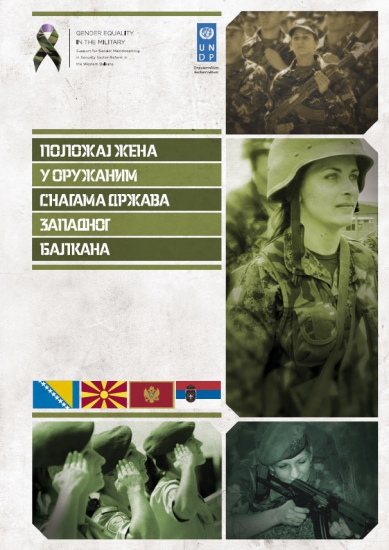Project: Support to the Women Police Officers Network in South East Europe (WPON)17Feb2014
The Study on the Position of Women in the Armed Forces in the Western Balkans Presented in Sarajevo
 Following its initial launch in Skoplje, the study on the Position of Women in the Armed Forces in the Western Balkans continues to receive great attention. The second in a series of region – wide presentations of the study was organized by the Ministry of Defence of Bosnia and Herzegovina, with the support of UNDP/SEESAC, on 17 February 2014 in Sarajevo.
Following its initial launch in Skoplje, the study on the Position of Women in the Armed Forces in the Western Balkans continues to receive great attention. The second in a series of region – wide presentations of the study was organized by the Ministry of Defence of Bosnia and Herzegovina, with the support of UNDP/SEESAC, on 17 February 2014 in Sarajevo.The study is a joint endeavor of the Ministries of Defence of Bosnia and Herzegovina, Montenegro, Serbia and the former Yugoslav Republic of Macedonia, conducted with the support of UNDP/SEESAC, and as such represents a truly unique example of regional cooperation. It provides regionally comparable data on the position of women in the armed forces (AF) in the Western Balkans invaluable for the development and implementation of effective gender sensitive recruitment and retention policies.
The promotion in Sarajevo was hosted by Ms. Marina Pendeš, Deputy Minister of Defence of Bosnia and Herzegovina who noted that by introducing gender equality principles in all areas of social and work life, we are helping achieve some of the basic human rights and freedoms. “With this aim in mind, and within the framework of a regional project, research on the position of women in the armed forces in the Western Balkan countries was carried out, giving way to this study." said Ms. Pendeš.
Ms. Pendeš also pointed out that the regional study data provides a baseline necessary for reviewing and improving conditions under which women are included in the ranks of the Armed Forces of Bosnia and Herzegovina.
H.E. Vibeke Lilloe, Ambassador of the Kingdom of Norway, reiterated that the study represents a good example of regional cooperation of the Ministries of Defence in the Western Balkans which initiated significant measures to achieve the goals related to increased involvement of women in the AFs in the Western Balkans.
Reflecting on his 40 years of experience in the military, Brigadier General Merle D. Hart, Commander of NATO Headquarters in Sarajevo, stated that women add to its intellectual and operational capacities.
Dr. Ivan Zverzhanovski, SEESAC Coordinator, highlighted the fact that the four participating Ministries of Defence not only recognized the need to attract and retain women in the defense and armed forces but, guided by this realization, jointly developed a methodology, collected the data, and formulated low-cost and quick-win measures to make security institutions more efficient.
Members of the working group from the four participating Ministries presented the study and emphasized that the study was very successful example of regional cooperation.
The study is currently available in English, Albanian, Bosnian, Croatian, Macedonian and Serbian.
ABOUT THE GENDER EQUALITY IN THE MILITARY PROJECT
SEESAC's Gender Equality in the Military project aims to create a more conducive environment for the advancement of women in the military in the Western Balkans. With this as its goal, SEESAC is supporting the Ministries of Defense in Bosnia and Herzegovina, the former Yugoslav Republic of Macedonia, Montenegro and Serbia in their efforts to ensure better integration, retention and professional development for women in the armed forces as well as stronger participation of women in decision-making and gender sensitive change in their organizational cultures.



